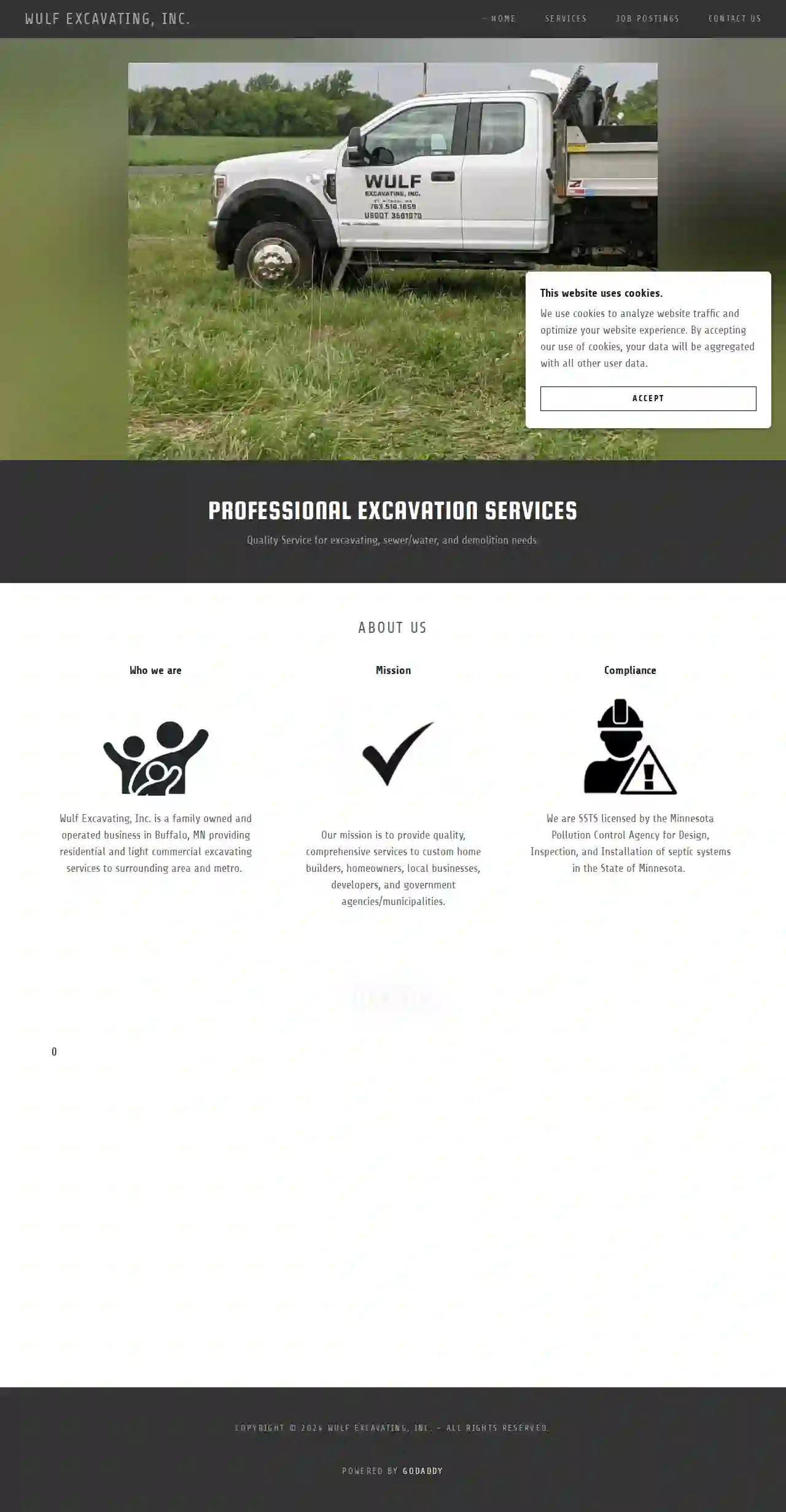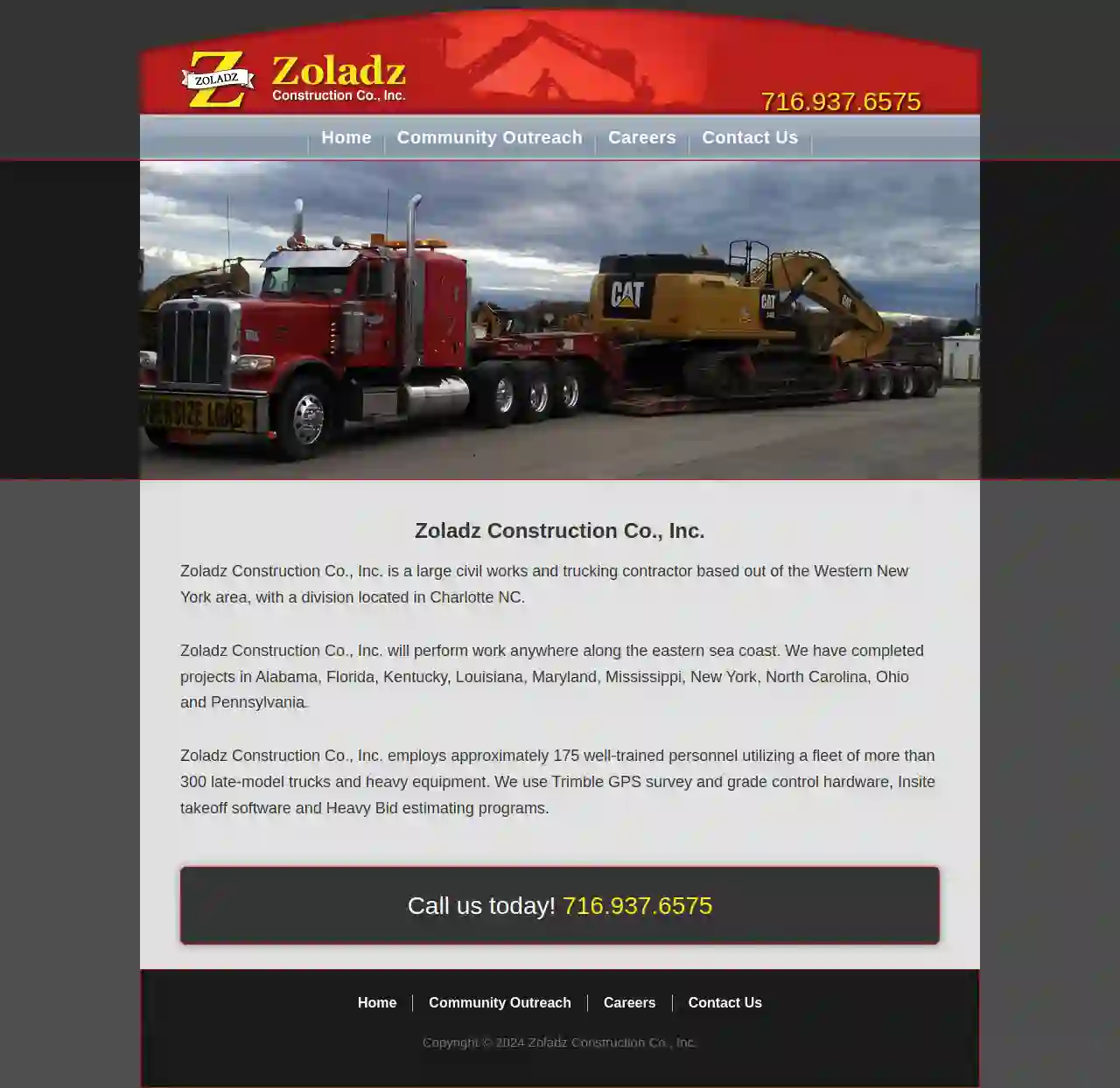Dirt Contractors Buffalo
Find top Dirt Removal in Buffalo
Receive up to 3 Dirt Contractors quotes for your project today! Compare profiles, reviews, accreditations, portfolio, etc... and choose the best service.

Wulf Excavating, Inc.
51 reviewsBuffalo, US- Services
- Why Us?
Get Quote
Zoladz Construction
4.246 reviewsBuffalo, USZoladz Construction Co., Inc. Zoladz Construction Co., Inc. is a large civil works and trucking contractor based out of the Western New York area, with a division located in Charlotte NC. Zoladz Construction Co., Inc. will perform work anywhere along the eastern sea coast. We have completed projects in Alabama, Florida, Kentucky, Louisiana, Maryland, Mississippi, New York, North Carolina, Ohio and Pennsylvania. Zoladz Construction Co., Inc. employs approximately 175 well-trained personnel utilizing a fleet of more than 300 late-model trucks and heavy equipment. We use Trimble GPS survey and grade control hardware, Insite takeoff software and Heavy Bid estimating programs.
- Services
- Why Us?
- Gallery
Get Quote
Over 3,943+ Excavation Contractors in our network
Our excavation contractors operate in Buffalo and surroundings!
ExcavationHQ has curated and vetted Top Excavation Businesses in and around Buffalo. Find a reliable pro today.
Frequently Asked Questions About Dirt Contractors
- Erosion Control: Berms can intercept and slow down runoff, preventing soil erosion and sedimentation.
- Noise Reduction: Berms can act as noise barriers, reducing noise pollution from traffic, construction, or industrial activities.
- Visual Screening: Berms can block unsightly views, create privacy, or define property boundaries.
- Security: Berms can serve as security barriers, deterring unauthorized access or vehicle intrusion.
- Landscaping: Berms can enhance landscaping by creating elevation changes, providing planting areas, or defining garden beds.
- Clearly Define Your Project Scope: Provide the contractor with detailed information about your project, including the size of the area, the type and volume of dirt needed, the desired grading or leveling, and any specific requirements.
- Obtain Multiple Quotes: Request quotes from multiple reputable dirt contractors to compare prices, services, and experience. Ensure the quotes are comprehensive and include all project details.
- Verify Licensing and Insurance: Confirm that the contractor has the necessary licenses, insurance coverage, and a good safety record. This protects you from potential liabilities.
- Communicate Openly and Regularly: Maintain open communication with the contractor throughout the project, addressing any questions, concerns, or changes promptly. Regular updates and site visits can help ensure everything is on track.
- Document Everything: Keep written records of all communication, contracts, quotes, and invoices for reference and accountability.
- Project Scope: The size and complexity of the project, including the volume of dirt to be moved, the distance for hauling, and the type of services required.
- Dirt Type: Different dirt types have varying costs based on availability and demand. Topsoil is typically more expensive than fill dirt.
- Location: Costs may differ depending on the contractor's location and the accessibility of the project site.
- Equipment Needed: Specialized equipment, such as excavators, bulldozers, or dump trucks, can influence the overall cost.
- Labor Costs: The number of workers and their hourly rates will affect the labor portion of the cost.
- Designated Disposal Facilities: Contact your local waste management authority or search online for designated dirt and debris disposal facilities in your area. They accept various types of soil and construction materials.
- Recycling Centers: Some recycling centers accept clean fill dirt, concrete, or brick for reuse in other construction projects.
- Donation: If the dirt is clean and suitable for gardening or landscaping, consider donating it to community gardens, schools, or neighbors with landscaping projects.
What is a dirt berm, and what are its uses?
What are some tips for working with dirt contractors?
How much does it cost to hire a dirt contractor?
What is the best way to dispose of excess dirt?
What is a dirt berm, and what are its uses?
- Erosion Control: Berms can intercept and slow down runoff, preventing soil erosion and sedimentation.
- Noise Reduction: Berms can act as noise barriers, reducing noise pollution from traffic, construction, or industrial activities.
- Visual Screening: Berms can block unsightly views, create privacy, or define property boundaries.
- Security: Berms can serve as security barriers, deterring unauthorized access or vehicle intrusion.
- Landscaping: Berms can enhance landscaping by creating elevation changes, providing planting areas, or defining garden beds.
What are some tips for working with dirt contractors?
- Clearly Define Your Project Scope: Provide the contractor with detailed information about your project, including the size of the area, the type and volume of dirt needed, the desired grading or leveling, and any specific requirements.
- Obtain Multiple Quotes: Request quotes from multiple reputable dirt contractors to compare prices, services, and experience. Ensure the quotes are comprehensive and include all project details.
- Verify Licensing and Insurance: Confirm that the contractor has the necessary licenses, insurance coverage, and a good safety record. This protects you from potential liabilities.
- Communicate Openly and Regularly: Maintain open communication with the contractor throughout the project, addressing any questions, concerns, or changes promptly. Regular updates and site visits can help ensure everything is on track.
- Document Everything: Keep written records of all communication, contracts, quotes, and invoices for reference and accountability.
How much does it cost to hire a dirt contractor?
- Project Scope: The size and complexity of the project, including the volume of dirt to be moved, the distance for hauling, and the type of services required.
- Dirt Type: Different dirt types have varying costs based on availability and demand. Topsoil is typically more expensive than fill dirt.
- Location: Costs may differ depending on the contractor's location and the accessibility of the project site.
- Equipment Needed: Specialized equipment, such as excavators, bulldozers, or dump trucks, can influence the overall cost.
- Labor Costs: The number of workers and their hourly rates will affect the labor portion of the cost.
What is the best way to dispose of excess dirt?
- Designated Disposal Facilities: Contact your local waste management authority or search online for designated dirt and debris disposal facilities in your area. They accept various types of soil and construction materials.
- Recycling Centers: Some recycling centers accept clean fill dirt, concrete, or brick for reuse in other construction projects.
- Donation: If the dirt is clean and suitable for gardening or landscaping, consider donating it to community gardens, schools, or neighbors with landscaping projects.